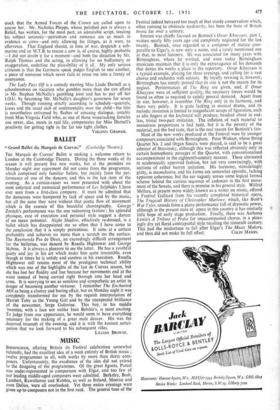MUSIC
BIRMINGHAM, offering Britain its Festival celebration somewhat belatedly, had the excellent idea of a week entirely of British music ; twelve programmes in all, with works by more than thirty com- posers. Unfortunately, the excellence of the idea did not extend to the designing of the programmes. Of the great figures, Pureel was under-represented in comparison with Elgar, and too few of our leading middle-aged composers were admitted. Berkeley, Bush, Lambert, Rawsthorne and Rubbra, as well as Ireland, Moeran and even Delius, were all overlooked. Yet three entire evenings were given up to composers not in the first rank. The general tone of the Festival indeed betrayed too much of that sturdy conservatism which, often running to obstinate mediocrity, has been the bane of British music for over a century.
Interest was chiefly focused on Bantock's Omar Khayyam, part 1, written nearly fifty years ago and completely neglected for the last twenty. Bantock, once regarded as a composer of stature com- parable to Elgar's, is now only a name, and a rarely mentioned one at that, to most listeners. He was associated for many years with Birmingham, where he worked, and even today Birmingham musicians maintain that it is only the extravagance of his demands that denies his works a place in the repertory. Omar Khayyam is a typical example, playing for three evenings, and calling for a vast chorus and orchestra with soloists. By loyally reviving it, however, Birmingham has simply proved that its size is not the reason for its neglect. Performances of The Ring are given, and, if Omar Khayyam were of sufficient quality, the necessary forces would be found as often as required to satisfy general demand. Apart from its size, however, it resembles The Ring only in its harmony, and there very palely. It is quite lacking in musical drama, and its melodic invention is limited to insignificant scraps of figuration, such as idle fingers at the keyboard will produce, bandied about in end- less, trivial two-part imitation. The inflation of such material to monstrous proportions is bad taste, but it is the poverty of the material, not the bad taste, that is the real reason for Bantock's fate.
Most of the new works produced at the Festival were by younger composers associated with Birmingham. Peter Wishart, whose String Quartet No. 2 and Organ Sonata were played, is said to be a great admirer of Stravinsky, although this was reflected obviously only in certain homophonic passages of the Quartet, with conventionalised accompaniment in the eighteenth-century manner. These alternated in academically approved fashion, but not very convincingly, with sections of rather barren imitation. His harmony, stimulatingly gritty, is inconclusive, and his forms are somewhat episodic, lacking apparent coherence, but the ear vaguely senses some logical formal scheme behind the curious sequence of cadences in the first move, ment of the Sonata, and there is promise in his general style. Wilfrid Mellers, at present more widely known as a writer on music, offered a Festival Galliard from his recently completed historical opera, The Tragical! History of Christopher Marlowe, which, like Bush's Wat Tyler, sounds from a piano performance full of dramatic power, although in the present state of opera in this country it has similarly little hope of early stage production. Finally, there was Anthony Lewis's A Tribute of Praise for unaccompanied chorus, in a pleas. ingly dry yet florid contrapuntal style recalling the sixteenth century, This had the misfortune to fall after Elgar's The Music Makers, and thus did not make its full effect. COLIN MASON.


































 Previous page
Previous page